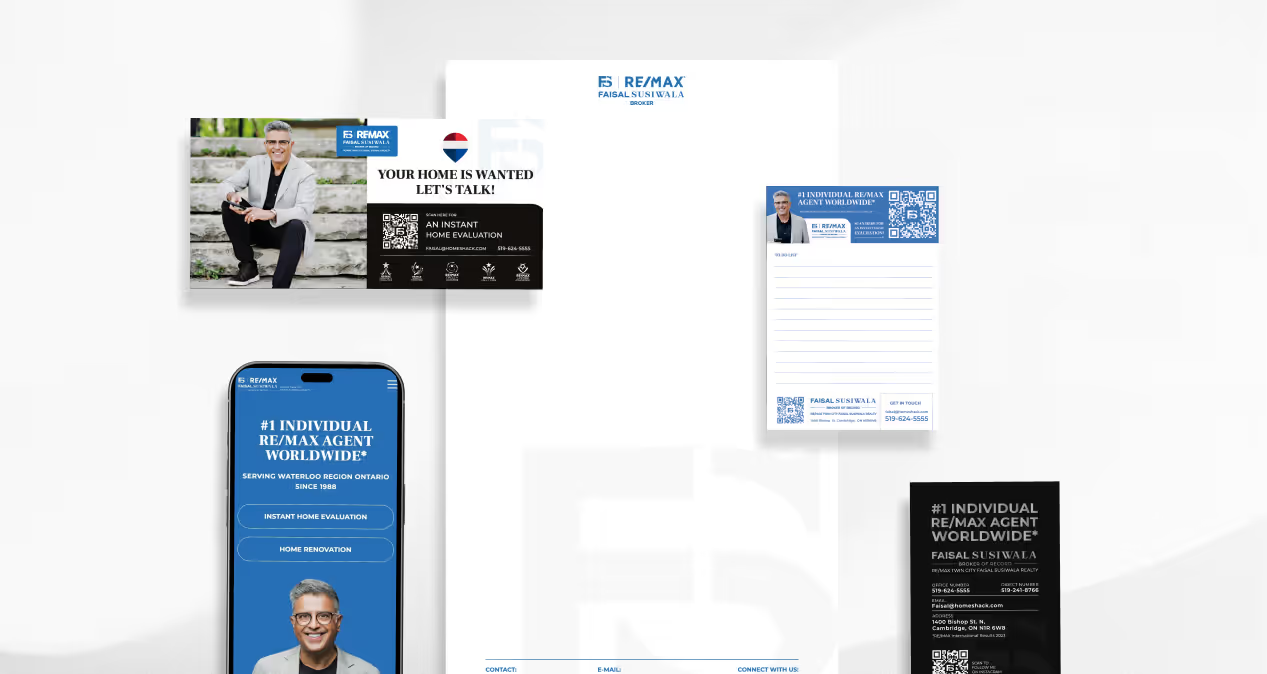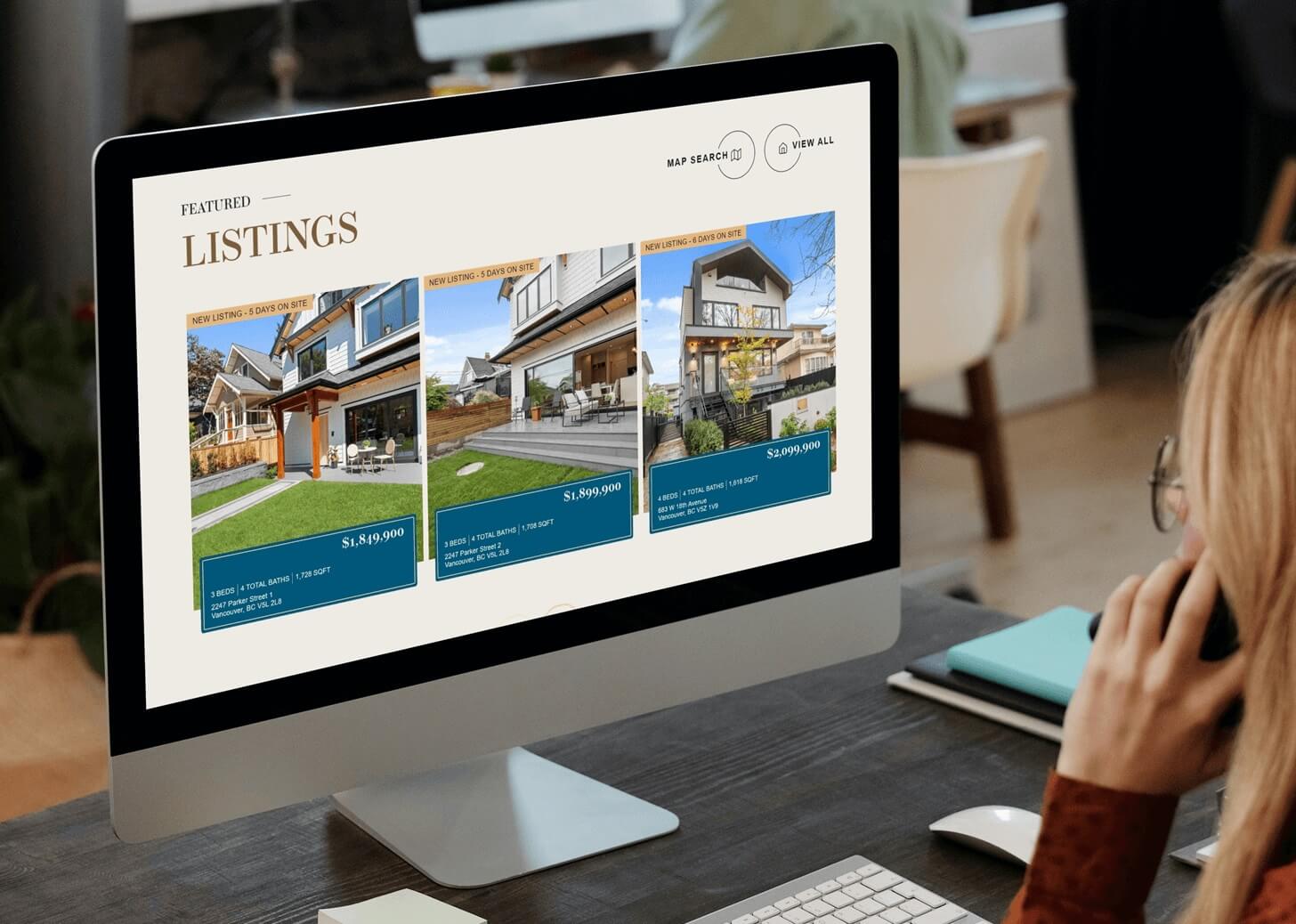
Let’s be honest — choosing a real estate website builder can be confusing.
There are platforms “made for agents,” builders that promise all-in-one solutions, and options that claim to generate leads overnight. But here’s the truth: most of those templated platforms make every agent’s site look and feel exactly the same.
If you want your brand to stand out, attract clients, and support your marketing campaigns, you need to think beyond templates. Here’s how to choose the right setup for your business — and what actually works in today’s market.

1. Don’t Fall for “Real Estate-Specific” Templates
It’s easy to think that a website builder made for real estate is the best choice. But in reality, most of those platforms lock you into templates that hundreds of other agents in your city are already using.
Yes, they’re convenient — but convenience comes at a cost: your brand identity. You can’t fully customize layouts, colors, or interactions, and the moment you stop paying, your entire site disappears. You don’t own it.
If you’re serious about building a brand, look for a flexible platform you can actually customize and own — like Webflow (for a more high-end, modern design) or WordPress (for flexibility and scalability). Even though they’re not “real estate-specific,” they integrate easily with IDX and give you total creative freedom.
Bottom line: Skip cookie-cutter platforms. Invest in something you can truly make yours — and keep control of it.
2. Balance Design and Strategy
A lot of builders market themselves around “lead generation,” but if your website looks outdated or unprofessional, you’ll lose credibility before anyone fills out a form.
Yes, structure matters — you need clear CTAs and pages built to convert. But design matters just as much. Your website should look good, feel modern, and instantly communicate trust.
The right approach is strategic design — not one or the other.
If your business focuses on buyers, create calls-to-action like:
- Book a free buyer consultation
- Get VIP access to listings before they hit the market
If you focus on sellers, make it about your expertise and results — for example:
- Find out what your home is worth
- See how we market listings differently
Every page should be designed to support your specific client journey — not just to “generate leads.”
3. Choose a Platform You Can Customize (and Own)
This goes beyond branding. Ownership matters.
When you use most real estate platforms, you’re renting space — not building equity. If you cancel, your website and data disappear. But when you build on platforms like WordPress, you own your files, your content, and your design. You can move hosts, expand your site, and evolve with your business.
At Zinda, we always recommend building something custom — even if it starts small. You get control, flexibility, and a website that’s truly yours.
4. SEO and Performance Aren’t Optional
Let’s be clear: every website should be SEO-optimized and fast. It’s not a nice-to-have — it’s the baseline.
But today, SEO alone isn’t enough. The competition is steep, and every agent has a site. What makes the difference now is how your website fits into your overall marketing funnel.
Think of your website as your main landing hub — where all your campaigns point.
Your social ads, Google Ads, flyers, and even signs should lead to your website. That means it needs dedicated landing pages that convert — not just a homepage with your bio.
Your website is the center of your marketing ecosystem.
SEO brings visitors. Campaigns drive traffic. Your design converts them.
5. Make Sure It Grows With You
Your business will evolve — your website should too. Whether you’re starting out solo or growing into a full team, the platform you choose should be able to scale with your goals.
That’s another reason we don’t recommend closed, subscription-based builders. They limit your flexibility. With custom-built sites, you can add pages, integrate tools, and expand features as your business grows — without starting over.
If you’re just beginning, it’s okay to start simple. But when you’re ready to build your brand seriously, invest in a custom solution that’s built to last.
Final Thoughts

There’s no “perfect” real estate website builder — but there is a right approach.
Choose flexibility over templates. Prioritize ownership, strategy, and design equally. And remember: your website isn’t just an online brochure — it’s the engine that drives your entire marketing system.
And if you’re looking for an agency that can help you build a real estate website without locking you into monthly payments, Zinda can help. We create custom real estate websites that look refined and perform beautifully. If your budget is limited, we can also work within platforms like myRealPage to create something unique that still reflects your brand. We’re happy to offer a free consultation to discuss your options and build a website that fits how you actually work — whether you’re attracting luxury buyers, first-time sellers, or growing your brand presence.


.jpg)


.jpg)

